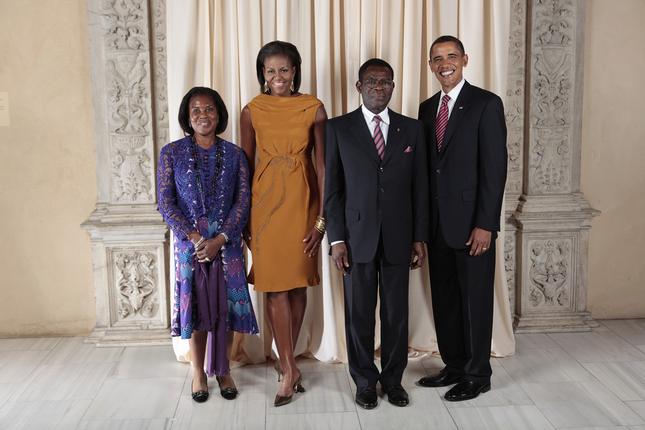At Summit, Equatorial Guinea’s President Looks to Soften Image
By • October 28, 2014 0 1609

President Obama and other African leaders are expected to meet with President Teodoro Obiang Nguema Mbasogo of Equatorial Guinea, who denies ongoing human rights abuses in the small Central African nation.
Obiang will be honored by the Corporate Council for Africa, which is highlighting the “new Africa” at the summit, according to Al Jazeera America.
Many meetings will be held during the first-ever U.S.-Africa Leaders Summit in Washington D.C. from Aug. 4 to Aug. 6, with 50 heads of state in the city at the same time. It is the largest gathering of national leaders ever for a three-day event in the nation’s capital.
“President Obiang is trying to shed his image as the head of a corrupt and abusive government,” said Lisa Misol, senior business and human rights researcher at Human Rights Watch. “Instead of giving him propaganda opportunities, President Obama should press for an end to torture, corruption and other abuses that are rife in Equatorial Guinea.”
In a recent human rights report, the State Department cited the most serious human rights abuses in Equatorial Guinea as “disregard for the rule of law and due process, including police use of torture and excessive force; denial of freedom of speech, press, assembly, and association; and widespread official corruption.”
Nguema Mba, a former military officer who was granted status as a refugee in Belgium in 2013, was abducted illegally in his visit to Nigeria in late 2013 and turned over to Equatorial Guinea, where he is believed to be held by government authorities and tortured. Nguema still remains in custody and reportedly was transferred to solitary confinement on July 26.
The Obiang government has denied that torture takes place in Equatorial Guinea. In 2013, when the United Nations Committee on Economic, Social, and Cultural Rights inspected the country, the delegation from the government highlighted “the absence of torture in the country’s prisons and the care given to inmates.”
Equatorial Guinea is one of the largest oil-producing countries in sub-Saharan Africa and has a population of 735,000, making it the wealthiest country per capita in Africa.
However, government critics allege that corruption has led to the country having only a small portion of the population sharing the wealth, while conditions for most Guineans remain worse than in many African countries with fewer natural resources.
“It is shocking that President Obiang gets the red-carpet treatment in Washington while his perceived opponents in Equatorial Guinea are thrown in prison to be flogged,” said Tutu Alicante, a human rights lawyer from Equatorial Guinea. “We hope President Obama tells President Obiang loud and clear to end false imprisonment, torture and oil-fueled corruption.”
Obiang has been in power since 1979 as its president, having overthrown his uncle, who was the first president of the small nation, in a bloody coup d’etat.

